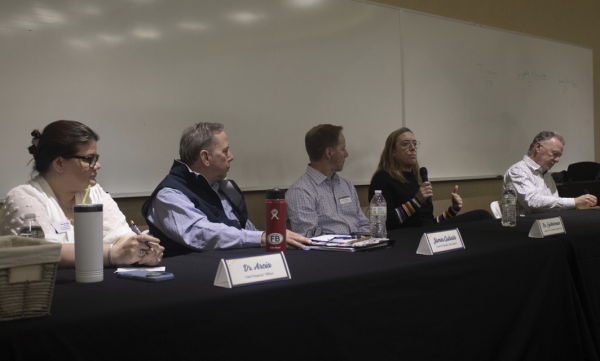RWU community response to lockdown drill needs improvement
At around 11:40 a.m. on Tuesday, April 24, RWU’s Siren Warning System rang loudly throughout campus, signaling a lockdown drill. Despite the multiple text messages, emails, and phone calls that community members received, many students reported that normal activities resumed in their buildings and classrooms during the drill.
In the event of a Lockdown, according to RWU’s Emergency Response Plan, entrances are to be secured and no one is to be permitted to exit or enter any building. People are instructed to stay where they are if in a secured area, and if in a hallway or other open space, people are instructed to “proceed to the nearest classroom, office or other room within the locked-down facility.”
Senior Eleni Karavoussianis was sitting in the front half of Upper Commons during the drill and said that “basically everyone kept eating” and “the glass door you enter into Commons” was kept open. However, the large shades in the dining hall were pulled down.
Senior Jamie Hipsman was in the bathroom in Global Heritage Hall when the alarm sounded, and noted that she couldn’t hear it. When she returned to her class where they were watching a movie, she saw the alerts for the drill on her phone, but the class was still going on. She does not believe her professor was aware the drill was happening.
“A lot of people don’t take these lockdown drills seriously even if they are following the protocol and it makes me nervous to think what would actually happen if we were in a real lockdown,” said Hipsman.
RWU decided to give the campus community a heads up about the lockdown drill, sending an email out on April 17, seven days before the drill was conducted. In the email, the Emergency Response Team alerted students that the drill would be occurring on both the Bristol and Providence campuses. They also asked that people “actively follow the directions provided” and “shelter in place” until the message was received that the lockdown test had ended.
The email also gave several resources for students, faculty, and staff to look at, including: RWU’s Emergency Response Plan, details about the Rave Guardian app, a link to a Hostile Intruder training video, and a link to update your contact information for the RWU Alert emergency notification system.
The Hostile Intruder video starts out with an unnamed police officer saying, “Alright, this will only take a couple of minutes, but it’s something you need to hear.”
The video places the viewer in several first-person active shooter situations and begins to show what students can do to be as prepared as possible if they find themselves in a similar situation: plan, evaluate, respond.
The officer in the video encourages the viewer to know the emergency exits in the room, evaluate the situation, and respond to it. “You probably know where the power outlets are to charge things, but do you know where all the exits are?” the officer asks.
According to Kathy Souza, director of the Department of Environmental Health and Safety, 60 people have viewed this training video since January, with more than half of those views being students.
The ERP also states that there are training requirements for students, faculty, and staff that should be conducted annually. Souza said, “there is an online training link as well as live trainings conducted at the request of individual departments.” She said the last training was on March 15, and there are three scheduled trainings next week. The training is open to anyone on campus, and a calendar of open trainings will be sent out some time in the next week.
“From what I viewed so far, I think the drill went well overall,” Souza said. “There were some instances where the drill was ignored and individuals were outside of a building, or individuals went outside prior to the end of the drill.”
Souza also mentioned she saw staff members asking others to “remain inside” or move to a more secure area. In the future, the university is working toward notifying the campus community of a lockdown via computer screen, which would be beneficial in the areas with no cell phone service.





